Every week, AGENDA goes in search of the sound & vision of Brussels. This week we’re off to fucking hell with the dyslectics of WREK: “If it ain’t broke, fix it!”
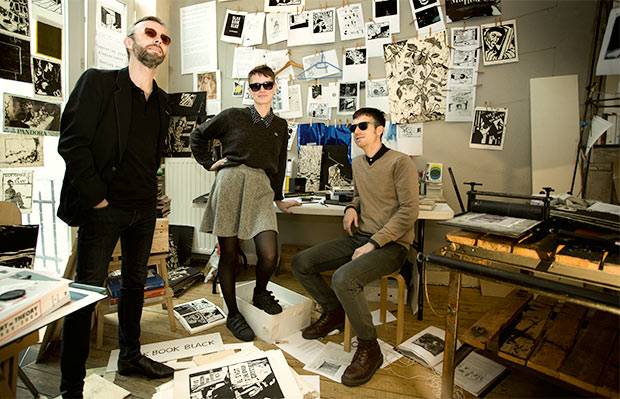
© Heleen Rodiers
Wunderkammer: WREK
“We don’t know where we are going, but we’re going,” says Arnaud Rochard, one fourth of the crew behind Le Kabinet, a tiny but wonderfully passionate spot for artistic expression near – but never getting any closer to – tram stop Jules de Trooz. That’s just as well. Jean-Luc Godard once said: “Cinema is not the station, cinema is the train.” “The adventure is in the journey,” to put it in the words of Miles O Shea, the Irishman who together with Olivier Deprez makes up WREK – a play on the German word Werk, or rather a new alphabet for a countercultural approach. “What I do with Olivier is not about art. It’s about working, about making, about the process of work, and how that fits into your life. Even life is just the end product of your work. But that isn’t our focus. That is the process, what you do.”
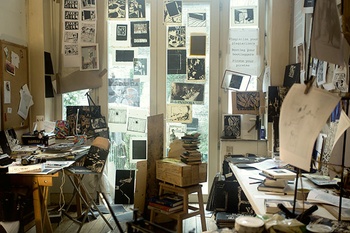
So what do they do? Well, WREK is reclaiming comics, making animation films from woodcut prints, walking around with a “RollerTableTower”, filming a mountain’s flat surface, singing “woo woo”, printing black pages, and repeating that process over and over again. But above all: they sever moments from time, stretch them out with amazement, insert doubt, create unrest, comfort you, draw you out of prevailing paradigms for a total renaissance, tell you things were never any different, foster the paradox, and then bring you back to the essentials. Nothing more, nothing less. “That is it,” as Miles O Shea puts it. “If in billiards you’re thinking too much about the next shot, you’ll fuck up this one. Keep your eyes on the ball. On what matters. Which is the matter. I have been printing black prints for almost ten years, and still, each time I make one, I’m coming at it like: ‘Yeah, done this before. I know what I’m doing here.’ And yet, there is always a point where I’m puzzled about what is going on. But unlike the artist standing back from the work and asking himself: ‘Is that it?’, for me there is no question. It’s the doing and saying: that is it. It’s getting to what you consider to be essential: the black print and making it. It narrows life and art down to what you perceive as important things, and that again ties in with the political aspect of the work: that you’re doing something which in the great scheme of things, for the CEO of Goldman Sachs or Tate Modern, isn’t even on the radar. For me, ultimately, this is an act of defiance, of revolt.”
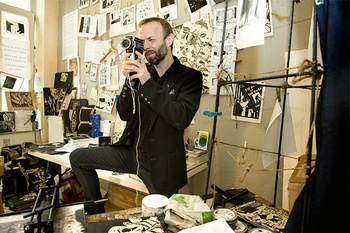
“When you listen to the Stooges or the Velvet Underground, you’re not thinking about how well they can play that guitar. No, you just listen and it goes directly to you. It has nothing to do with any sort of aesthetic quality. It’s more about the abuse of the medium, about the will to tear it up, to keep it raw and vital. Working with Marine, who will make a fanzine for the exhibition, and Arnaud at Le Kabinet is just like that. We just go for it together, with the same attitude.” Marine Penhouët: “For this sort of exhibition, you don’t simply arrive with your canvasses that you already painted in your studio. In ‘FUCKING HELL’ we find ourselves on the side of the audience, confronted with something we haven’t seen before. Even if we know all the ingredients, and we each bring in our own technicity and experience, it’s still a poker game. What will happen, we don’t know. It cuts the line between you and the work. Is it mine? Is it ours? Is it autonomous? That is really interesting.”
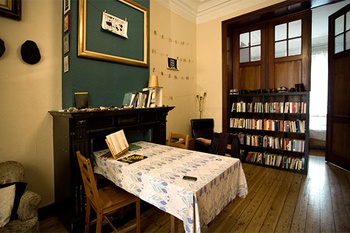
A history of eight years between the Brussels-based Irishman and his fellow operator based in southern France has not made their collaboration any easier to define. What else could you expect, knowing it was a scene from Samuel Beckett’s Waiting for Godot that brought them together. Miles O Shea: “When I met Olivier Deprez, I had a hat in my hand, and I was peering into it, shaking and turning it…and he recognised it from Waiting for Godot. When we began talking, we could hardly understand each other: his English was almost non-existent then, and my French was like it is now, but worse. Nonetheless, we immediately decided to work together. It was another WREK way of doing things: great, we won’t understand anything. It’s a language that refuses to allow in those distractions of eloquence and virtuosity. I remember when I went to see Olivier for the first time in the south of France, we went for a big long walk in the country and he was telling me a story about a film. After fifteen minutes, I was completely lost. I had no idea what he was talking about. Olivier himself had no idea what he was talking about. And at some point we were also physically lost. I said: ‘But you live here.’ And he said: ‘But I was never here.’ [Laughter] But we went on, and found a way. It’s still like that.”
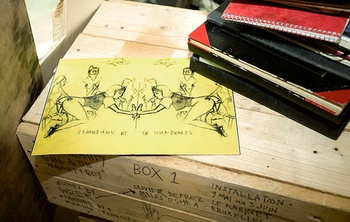
“You know that phrase: If it ain’t broke, don’t fix it?” Miles O Shea asks. “Well, for me, if it ain’t broke, it’s not working. I never want to come to a conclusion. So if it ain’t broke, fix it!”
“I can’t go on. I’ll go on,” Samuel Beckett would say with a tip of the hat.
Borough: Schaarbeek/Schaerbeek
Exhibition: “Fucking Hell”: 28/11 > 16/12, visit by appointment: lekabinet@gmail.com, Le Kabinet
Info: lekabinetbxl.wordpress.com
Photos © Heleen Rodiers
Wunderkammer
Read more about: Expo , Wunderkammer
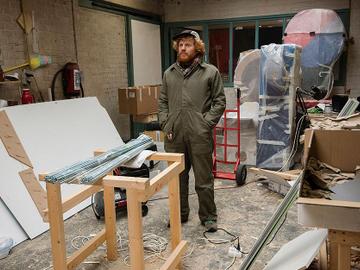

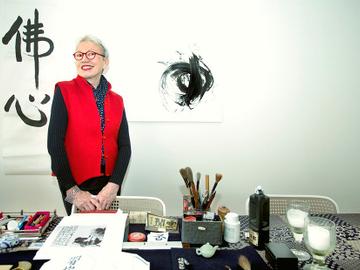
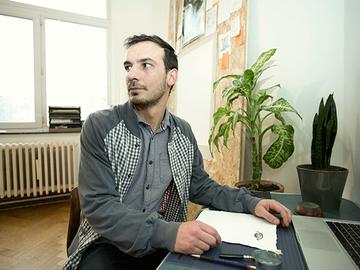
Fijn dat je wil reageren. Wie reageert, gaat akkoord met onze huisregels. Hoe reageren via Disqus? Een woordje uitleg.